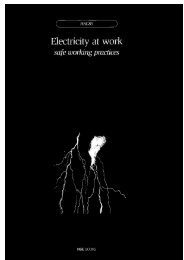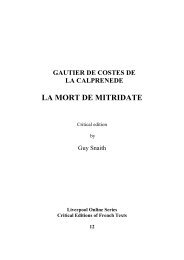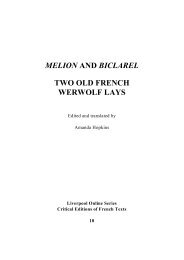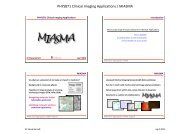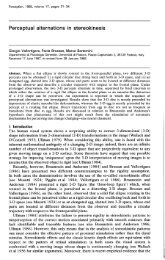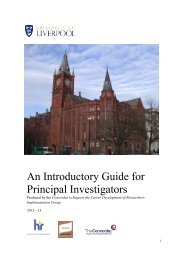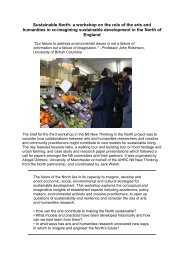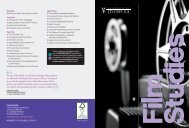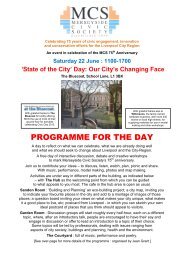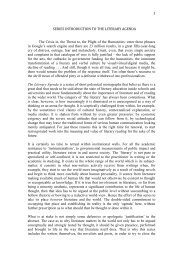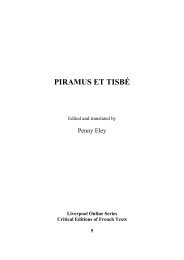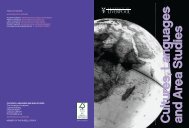Schiller Michael McGhee, University of Liverpool
Schiller Michael McGhee, University of Liverpool
Schiller Michael McGhee, University of Liverpool
You also want an ePaper? Increase the reach of your titles
YUMPU automatically turns print PDFs into web optimized ePapers that Google loves.
<strong>Schiller</strong><br />
<strong>Michael</strong> <strong>McGhee</strong>, <strong>University</strong> <strong>of</strong> <strong>Liverpool</strong><br />
1. I shall begin by <strong>of</strong>fering the very briefest account <strong>of</strong> the background to <strong>Schiller</strong>'s text, so that you will<br />
have some indication <strong>of</strong> the nature <strong>of</strong> the debate towards which it was <strong>of</strong>fered as a contribution. For the<br />
emphasis in the title is on the word aesthetic: 'On the aesthetic education <strong>of</strong> man', and <strong>Schiller</strong> is<br />
intervening in a discussion started by Rousseau and developed by Kant. Indeed, the earlier parts <strong>of</strong> the<br />
text are thick with the atmosphere <strong>of</strong> these two thinkers, and it is to the earlier part <strong>of</strong> the text that I shall<br />
direct attention now. The full title is On the Aesthetic Education <strong>of</strong> Mankind in a series <strong>of</strong> Letters, and there<br />
is a quotation from Rousseau's La Nouvelle Heloise on the title page, which takes us at once to the centre<br />
<strong>of</strong> <strong>Schiller</strong>'s concerns: si c'est la raison, qui fait l'homme, c'est le sentiment, qui le conduit. (if it is raison,<br />
which makes mankind, it is feeling which leads him). <strong>Schiller</strong>'s central preoccupation is precisely the<br />
relation between reason and feeling, or, since he follows Kant so closely, between duty and inclination,<br />
because it is, according to the philosophy <strong>of</strong> pure practical reason, reason itself which provides us with the<br />
objective criteria for determining what our duty is. Perhaps it ought to be said that Kant comes<br />
dangerously close to, if he does not actually embrace, the idea that if it is reason that makes mankind and<br />
feeling which leads him, then feeling invariably leads him astray, and Kant's moral heroes invariably<br />
manifest their heroism in the struggle against inclination for the sake <strong>of</strong> duty. I think we could say that for<br />
<strong>Schiller</strong> this struggle between duty and inclination, so far from being the path by which human beings are<br />
to attain their humanity, is precisely a symptom <strong>of</strong> the antagonism which has to be overcome if the species<br />
as a whole is to advance, and indeed, if the Kantian prescription were to be followed, it would simply lead<br />
to one form <strong>of</strong> political oppression: that in which, as <strong>Schiller</strong> puts it, the ideal human being suppresses the<br />
'empirical' human being, and the state annuls individuals. In brief, then, <strong>Schiller</strong> identifies the conflict<br />
within human beings between reason and feeling, duty and inclination, mind and matter, not as a<br />
permanent feature <strong>of</strong> our human situation, but as a disunity dependent upon conditions, which it is our task<br />
as a species to overcome: the vices and corruptions <strong>of</strong> social and political life are a function <strong>of</strong> this split<br />
within us, and they will not be eradicated in advance <strong>of</strong> the overcoming and healing <strong>of</strong> the split itself.<br />
In the first two books <strong>of</strong> Rousseau's Social Contract we find the famous distinction between the 'state <strong>of</strong><br />
nature' and the civil or the legitimate society. The early parts <strong>of</strong> the Aesthetic Education are, as I have<br />
said, thick with the atmosphere <strong>of</strong> Rousseau, and Rousseau's distinction is relied on heavily by <strong>Schiller</strong>.<br />
Without looking too closely at the doctrine <strong>of</strong> nature that underlines this distinction, let us turn our attention<br />
to the terms in which Rousseau enlarges on it. Essentially Rousseau seeks to establish a contrast<br />
between two general forms <strong>of</strong> social relation. The state <strong>of</strong> nature is defined in terms <strong>of</strong> those that are<br />
determined entirely by desire, physical impulse, instinct and inclination, in which, as a consequence, the<br />
will <strong>of</strong> the strongest rules. In a civil society, on the other hand, social relations are determined by<br />
considerations <strong>of</strong> reason and justice. In a civil or legitimate society the law will have effective sanctions,<br />
and it will establish rights, or areas <strong>of</strong> freedom, and corresponding duties, upon which those freedoms<br />
partly depend, conceived as being in the best interests <strong>of</strong> each <strong>of</strong> the members. By these standards, <strong>of</strong><br />
course, we none <strong>of</strong> us live in a civil or legitimate society but are still more or less in a state <strong>of</strong> nature. But<br />
according to Rousseau's picture, a stage is reached at which the people have found it too dangerous to<br />
continue to live in such a state and are ready to exchange their natural freedom for civil liberty. But the<br />
people, we could say, at once face an embarrassment, an impasse. When they decide to enter upon the<br />
civil society it can be said <strong>of</strong> them that they will the good, but are unable to discern it. They want what is in<br />
the common good, but they do not know what it consists in. They stand in need <strong>of</strong> education. Their<br />
educator, in Rousseau's scheme <strong>of</strong> things, is, <strong>of</strong> course, the law-giver, who can frame just laws because<br />
they can discern what is for the common good. But such a law-giver is impossible. If they come from<br />
among the people themselves, then, ex hypothesi they cannot discern the good: and where else are they<br />
to come from?<br />
In his Anthropology from a Pragmatic Point <strong>of</strong> View Kant <strong>of</strong>fers a succinct formulation <strong>of</strong> Rousseau's<br />
dilemma:<br />
This article was downloaded from Student Resources @ http://www.liv.ac.uk/Philosophy/Philos.html<br />
Email: mcghee@liverpool.ac.uk<br />
page: 1
But since (man) needs, for his moral education, good men who must themselves have been<br />
educated for it, and since none <strong>of</strong> these is free from (innate or acquired) corruption, the problem <strong>of</strong> moral<br />
education for our species remains unsolved even in principle...<br />
But Kant has his own proposal. The education <strong>of</strong> the species is to come not from an impossible law-giver<br />
but from Nature herself acting through history, teaching human beings the value <strong>of</strong> concord through the<br />
prolonged experience <strong>of</strong> antagonism and conflict. Apart from anything else, such antagonism is necessary<br />
also for the development <strong>of</strong> our human faculties, for, if concord were to be won too easily we would simply<br />
lead an Arcadian shepherd's life: 'Men, good-natured as the sheep they herd, would hardly reach a higher<br />
worth than their beasts'. Be that as it may, the Kantian prescription puts a high price on the education <strong>of</strong><br />
the species: he makes the following prophetic, not to say chilling comment:<br />
It is only from Providence that man anticipates the education <strong>of</strong> the human race, taking the species<br />
as a whole ... Only from Providence does he expect his species to tend to the civil constitution it<br />
envisages, which is to be based on the principle <strong>of</strong> freedom but at the same time on the principle <strong>of</strong><br />
constraint in accordance with law. That is, he expects it from a wisdom that is not his, but is yet the Idea <strong>of</strong><br />
his own reason, and Idea that is impotent (by his own fault). This education from above is salutary, but<br />
harsh and stern; nature works it out by great hardships, to the extent <strong>of</strong> nearly destroying the whole race.<br />
But Kant also made the important point that for Rousseau man is good only in a negative way, i.e., that<br />
man is not evil <strong>of</strong> his own accord and on purpose, but only ins<strong>of</strong>ar as he is led astray by evil or inept<br />
guides. For Rousseau, the people will the good, but do not discern it. Kant sees no difficulty in principle<br />
with the thought that human beings can already discern the good:<br />
The moral predisposition. The question here is: whether man is good by nature or evil by nature ...<br />
Man is a being who has the power <strong>of</strong> practical reason and is conscious that his choice is free (a person);<br />
and in his consciousness <strong>of</strong> freedom and in his feeling ... that justice or injustice is done to him or, by him<br />
to others, he sees himself as subject to a law <strong>of</strong> duty, no matter how obscure his ideas about it may be.<br />
This in itself is the intelligible character <strong>of</strong> humanity as such, and in so far as he has it man is good in his<br />
inborn predispositions (good by nature). But experience also shows that there is in man a tendency to<br />
actively desire what is unlawful even though he knows that it is unlawful - that is, a tendency to evil - which<br />
makes itself felt as inevitably and as soon as he begins to exercise his freedom, and which can therefore<br />
be considered innate. And so we must judge that man, according to his sensible character, is also evil (by<br />
nature). It is not self-contradictory to do this if we are talking about the character <strong>of</strong> the species; for we can<br />
assume that its natural destiny consists in continual progress towards the better.<br />
<strong>Schiller</strong>'s response to this rather long-term project is a sharp one:<br />
And in what kind <strong>of</strong> relation would we stand to either past or future ages, if the development <strong>of</strong><br />
human nature were to make such sacrifice necessary? We would have been the serfs <strong>of</strong> mankind; for<br />
several millennia we would have done slaves' work for them, and our mutilated nature would bear<br />
impressed upon it the shameful marks <strong>of</strong> this servitude. And all this in order that a future generation might<br />
in blissful indolence attend to the care <strong>of</strong> its moral health, and foster the free growth <strong>of</strong> its humanity! (6th<br />
letter)<br />
It is at this point that <strong>Schiller</strong> enters the debate with his passionate proposal that the education <strong>of</strong> the<br />
species is to be an aesthetic one.<br />
<strong>Schiller</strong>'s argument can be stated very briefly. The transition, which is a moral necessity, from the natural<br />
state ('which we may term any political body whose organisation derives originally from forces and not<br />
from laws') to the still hypothetical ideal society, has got to be effected without putting into jeopardy the<br />
very existence <strong>of</strong> society: physical humanity needs still to be around if moral humanity is to emerge, and so<br />
the transition has got to preserve it:<br />
the living clockwork <strong>of</strong> the state must be repaired while it is still striking, and it is a question <strong>of</strong><br />
changing the revolving wheel while it still revolves.<br />
This article was downloaded from Student Resources @ http://www.liv.ac.uk/Philosophy/Philos.html<br />
Email: mcghee@liverpool.ac.uk<br />
page: 2
<strong>Schiller</strong> concludes that<br />
a support must be looked for which will ensure the continuance <strong>of</strong> society, and make it independent<br />
<strong>of</strong> the natural state which is to be abolished.<br />
Very well, then, where is this support to be found? It is not to be found in the natural character <strong>of</strong> human<br />
beings, on the grounds that this is selfish and violent, 'and aims at the destruction <strong>of</strong> society rather than its<br />
preservation'. But nor is support to be found in our moral character because this is yet to be achieved and<br />
find expression in the ideal society itself. We cannot, by the same token, look for action from the state,<br />
which only gives expression to our natural character:<br />
For the state as at present constituted has been the cause <strong>of</strong> the evil, while the state as Reason<br />
conceives it, far from being able to lay the foundations <strong>of</strong> this better humanity, would itself have to be<br />
founded upon it.<br />
If neither our natural character nor our moral character is available to carry society through the transitional<br />
phase, then where are we to turn? We are to turn to a third character, which is kin to both the others, and<br />
this<br />
might prepare the way for a transition from the rule <strong>of</strong> mere force to the rule <strong>of</strong> law, and which,<br />
without in any way impeding the development <strong>of</strong> moral character, might on the contrary serve as a pledge<br />
in the sensible world <strong>of</strong> a morality as yet unseen.<br />
Only where such a character is predominant among a people, he thinks, is it safe to undertake the<br />
transformation <strong>of</strong> a state in accordance with moral principles. What is the nature <strong>of</strong> this character? It is in<br />
effect a fusion <strong>of</strong> the natural character and the moral character. The setting up <strong>of</strong> a moral state requires<br />
that we can count on the moral law as an effective force:<br />
if we are to be able to count on man's moral behaviour with as much certainty as we do on natural<br />
effects it will itself have to be nature, and he will have to be led by his very impulses to the kind <strong>of</strong> conduct<br />
which is bound to proceed from a moral character.<br />
To put it another way, the motive force <strong>of</strong> inclination and duty must produce 'completely identical results in<br />
the world <strong>of</strong> phenomena'. Si c'est la raison qui fait l'homme, c'est le sentiment qui le conduit. So feeling<br />
has to put its full weight behind reason. It is only when reason has the full weight <strong>of</strong> feeling behind it that it<br />
is possible for us to climb out <strong>of</strong> the state <strong>of</strong> nature.<br />
It is necessary to pause here, I think, to consider the importance <strong>of</strong> what <strong>Schiller</strong> is saying, since it marks a<br />
difference with Kant. Kant argued that what, as rational beings, we judge to be objectively necessary is,<br />
from a subjective point <strong>of</strong> view, i.e., from the point <strong>of</strong> view <strong>of</strong> the will, only contingent, because we can be<br />
diverted by the sway <strong>of</strong> contrary inclinations. It is only in a wholly rational being that what is judged<br />
objectively necessary is also subjectively necessary, because, said Kant, in a wholly rational being the will<br />
is the power to do only that which reason requires. Given the presence <strong>of</strong> contrary inclinations, given<br />
indeed, it almost looks, the presence <strong>of</strong> inclinations at all, we are not wholly reliable as moral beings. It<br />
looks very much as though Kant regards inclination as an aspect <strong>of</strong> our humanity that has to be curbed if<br />
reason is to rule. In some natures this no doubt works, but in others the odds are stacked pretty heavily<br />
against reason winning the contest, which is part <strong>of</strong> <strong>Schiller</strong>'s point. In order for it to be safe to effect the<br />
transition from the state <strong>of</strong> nature to the just society, duty and inclination must flow in the same direction.<br />
That is not, however, the way things stand at present. Human beings are one-sided in one <strong>of</strong> two ways:<br />
they are at odds with themselves when feeling predominates over principles, and when principles destroy<br />
feelings:<br />
One can ... imagine two different ways in which man existing in time can coincide with man as idea<br />
and in consequence just as many ways in which the state can assert itself in individuals: either by the ideal<br />
man suppressing empirical man and the state annulling individuals; or else by the individual himself<br />
This article was downloaded from Student Resources @ http://www.liv.ac.uk/Philosophy/Philos.html<br />
Email: mcghee@liverpool.ac.uk<br />
page: 3
ecoming the state, and man in time being ennobled to the stature <strong>of</strong> man as Idea.<br />
And <strong>Schiller</strong> comments:<br />
It is true that from a one-sided moral point <strong>of</strong> view this difference disappears. For reason is satisfied<br />
as long as her law obtains unconditionally. But in the complete anthropological view, where content<br />
counts no less than form, and living feeling too has a voice, the difference becomes all the more relevant.<br />
Reason does indeed demand unity: but nature demands multiplicity; and both these kinds <strong>of</strong> law make<br />
their claims upon man. The law <strong>of</strong> reason is imprinted upon him by an incorruptible consciousness; the<br />
law <strong>of</strong> nature by an ineradicable feeling. Hence it will always argue a still defective education if the moral<br />
character is able to assert itself only by sacrificing the natural. And a political constitution would still be<br />
very imperfect if it is able to achieve unity only by suppressing variety. The state should not only respect<br />
the objective and generic character in its individual subjects: it should also honour their subjective and<br />
specific character.<br />
This last remark seems to be a shaft directed against Rousseau, for whom, it is <strong>of</strong>ten thought, perhaps<br />
unfairly, there seems to be no special difficulty about the idea that private interest should be entirely<br />
submerged in the embrace <strong>of</strong> the General Will.<br />
But let us return to the two ways in which human beings may be 'at odds with themselves'. The two onesided<br />
conditions are that in which feeling predominates over principle, and that where principle destroys<br />
feeling. People are either 'savages' or 'barbarians'! But, and here we get a hint about what that third<br />
character is going to be, by contrast 'the man <strong>of</strong> culture' makes a friend <strong>of</strong> nature, and honours her<br />
freedom while curbing only her caprice. In other words, wholeness <strong>of</strong> character must be present in any<br />
people capable <strong>of</strong> exchanging a state <strong>of</strong> compulsion for a state <strong>of</strong> freedom.<br />
So <strong>Schiller</strong> has <strong>of</strong>fered us the idea that beauty precedes freedom. He has referred to our 'natural<br />
character' and to our 'moral character'. Neither <strong>of</strong> these can be relied upon to sustain physical humanity in<br />
the transition from a state <strong>of</strong> nature or compulsion to a state <strong>of</strong> freedom. Recourse must be had to a third<br />
character. The nature <strong>of</strong> this third character is now being revealed: it is the character <strong>of</strong> a human being<br />
who is at one with themself, in whom neither feeling predominates over principle nor in whom principle<br />
destroys feeling, one in whom inclination and duty produce identical results in the world <strong>of</strong> phenomena.<br />
<strong>Schiller</strong> now moves to the question whether this character is already present in his own society. Needless<br />
to say, the answer is no, and he <strong>of</strong>fers a stark enough description <strong>of</strong> that society, a description which is<br />
firmly anchored in a philosophical view about human nature. On the credit side he thinks<br />
- that the authority <strong>of</strong> received opinion has declined<br />
- that arbitrary rule is unmasked, though still armed with power<br />
- that people are beginning to demand their rights, even seizing by force what has been<br />
wrongfully denied them<br />
- the fabric <strong>of</strong> the natural state is tottering<br />
- its rotting foundations are giving way<br />
- there is a physical possibility <strong>of</strong> setting law upon the throne, <strong>of</strong> making true freedom the basis <strong>of</strong><br />
political association<br />
But no:<br />
Vain hope! The moral possibility is lacking, and a moment so prodigal <strong>of</strong> opportunity finds a<br />
generation unprepared to receive it.<br />
The picture that he now paints is founded upon what he has just described as the two ways in which<br />
human beings can be at odds with themselves. They are now presented as the 'two extremes <strong>of</strong> human<br />
depravity’; on the one side a return to the savage state and on the other, complete lethargy.<br />
Not surprisingly, it is the lower orders who are savage and the bourgeoisie who are lethargic. 'Among the<br />
lower and more numerous classes' we have<br />
This article was downloaded from Student Resources @ http://www.liv.ac.uk/Philosophy/Philos.html<br />
Email: mcghee@liverpool.ac.uk<br />
page: 4
crude, lawless instincts, unleashed with the loosening <strong>of</strong> the bonds <strong>of</strong> civil order, hastening with<br />
ungovernable fury to their animal satisfactions.<br />
He remarks at this point that an unjust state is better than no state at all, that the rule <strong>of</strong> law is better than<br />
its breakdown, even if those laws are sectional and exploitative. But let us come to what <strong>Schiller</strong> calls 'the<br />
cultivated classes', whose depravity is lethargy or enervation. Presumably they correspond to the case<br />
where principle destroys feeling. But <strong>Schiller</strong> <strong>of</strong>fers a more subtle picture than that perhaps suggests. It is<br />
a not unfamiliar anatomising <strong>of</strong> the middle class and its discreet charm. Before coming to it I want to<br />
stress the point made about lethargy as a form <strong>of</strong> depravity. Remember that earlier <strong>Schiller</strong> has talked <strong>of</strong><br />
the two motive forces <strong>of</strong> inclination and reason. The energy <strong>of</strong> the savage is unrestrained, but it<br />
predominates over reason. The state <strong>of</strong> lethargy among the so-called cultivated classes is a function <strong>of</strong><br />
the antagonistic relation between the motive forces <strong>of</strong> inclination and reason as <strong>Schiller</strong> is about to present<br />
it. The point about energy is <strong>of</strong> the very first importance, and it has, I believe been neglected almost<br />
entirely by Western philosophers, with the exception <strong>of</strong> <strong>Schiller</strong> and Nietzsche and, in our own time,<br />
Simone Weil. It emerges that the whole character is a vigorous character: the absence <strong>of</strong> vigour is an<br />
objection. The energy <strong>of</strong> our natural impulses is not to be emasculated but redirected. This makes<br />
<strong>Schiller</strong> a worthy forerunner <strong>of</strong> Nietzsche, who diagnosed the ills <strong>of</strong> Western society precisely as the<br />
emasculating, enervating outcome <strong>of</strong> internal division and self-violence. It is worth noting here that<br />
Nietzsche's admiration for Goethe is couched in terms that <strong>Schiller</strong> would have approved. Goethe strove<br />
to overcome in himself the separation <strong>of</strong> reason and feeling, sensuality and will. So, for <strong>Schiller</strong>, the whole<br />
character will be vigorous because it will be a character in which reason and inclination are no longer<br />
antagonistic, and in which reason will have the full force <strong>of</strong> impulse behind it. Energy <strong>of</strong> character, he will<br />
tell us, is the 'mainspring <strong>of</strong> all that is great and excellent in man'. But let us return to the cultivated<br />
classes.<br />
Here we have a case where the vices <strong>of</strong> reason are mixed with the vices <strong>of</strong> nature in a peculiar<br />
combination that leaves room for the virtues <strong>of</strong> neither. Instead <strong>of</strong> reason we have rationalisation justifying<br />
the worst aspects <strong>of</strong> nature, its ruthless acquisitive egoism. Where nature ought to be allowed to prevail<br />
and be accepted we have 'sham propriety', instead <strong>of</strong> natural sympathy we have 'proud self-sufficiency',<br />
instead <strong>of</strong> autonomous judgment we have subjection to slavish opinion. This confused complexity <strong>of</strong><br />
internal division issues in a kind <strong>of</strong> exhaustion: the cultivated classes are ... worn out. So the upshot is that<br />
the present age does not manifest the wholeness <strong>of</strong> character upon which further advance depends, but<br />
the opposite.<br />
We know that beauty is somehow involved in the cure. But first <strong>Schiller</strong> <strong>of</strong>fers us a brilliant account <strong>of</strong> the<br />
causes in his sixth letter, where he sees the fragmentation <strong>of</strong> the personality as the consequence <strong>of</strong> the<br />
division <strong>of</strong> labour brought about by the complexity <strong>of</strong> social organisation. He does not, however, see this<br />
fragmentation as permanent; civilisational progress must wait upon its overcoming:<br />
with us, one might almost be tempted to assert, the various faculties appear as separate in practice<br />
as they are distinguished by the psychologists in theory, and we see not merely individuals, but whole<br />
classes <strong>of</strong> men, developing but one part <strong>of</strong> their potentialities, while <strong>of</strong> the rest, as in stunted growths, only<br />
vestigial traces remain.<br />
The inner unity <strong>of</strong> human nature, which, he believed, was still to be found among the Greeks, was severed<br />
'through the rigorous separation <strong>of</strong> ranks and occupations, the divisions between the sciences, the<br />
necessary consequences <strong>of</strong> the increasingly complex machinery <strong>of</strong> the state';<br />
and with this confining <strong>of</strong> our activity to a particular sphere we have given ourselves a master within<br />
who not infrequently ends by suppressing the rest <strong>of</strong> our potentialities.<br />
This is a nice touch because it hints that the master-slave relation is reflected in the organisation even <strong>of</strong><br />
our inner lives. However, it is clear that <strong>Schiller</strong> is not talking about his proletariat here. He does,<br />
however, <strong>of</strong>fer a poignant image <strong>of</strong> the enslaved and fragmented individual, caught up in the ghastly<br />
machinery <strong>of</strong> the state:<br />
This article was downloaded from Student Resources @ http://www.liv.ac.uk/Philosophy/Philos.html<br />
Email: mcghee@liverpool.ac.uk<br />
page: 5
it was scarcely to be expected that the simple organisation <strong>of</strong> the early republics should have<br />
survived the simplicity <strong>of</strong> early manners and conditions: but instead <strong>of</strong> rising to a higher form <strong>of</strong> organic<br />
existence (government) degenerated into a crude and clumsy mechanism...<br />
... an ingenious clockwork, in which, out <strong>of</strong> the piecing together <strong>of</strong> innumerable but lifeless parts, a<br />
mechanical kind <strong>of</strong> collective life ensued. State and Church, laws and customs, were now torn asunder;<br />
enjoyment was divorced from labour, the means from the end, the effort from the reward. Everlastingly<br />
chained to a single little fragment <strong>of</strong> the whole, man himself develops into nothing but a fragment;<br />
everlastingly in his ear the monotonous sound <strong>of</strong> the wheel that he turns, he never develops the harmony<br />
<strong>of</strong> his being and instead <strong>of</strong> putting the stamp <strong>of</strong> humanity upon his own nature he becomes nothing more<br />
than the imprint <strong>of</strong> his occupation or <strong>of</strong> his specialised knowledge. But even that meagre, fragmentary<br />
participation, by which individual members <strong>of</strong> the state are still linked to the whole, does not depend upon<br />
forms which they spontaneously prescribe for themselves (for how could one entrust to their freedom <strong>of</strong><br />
action a mechanism so intricate and so fearful <strong>of</strong> light and enlightenment?); it is dictated to them with<br />
meticulous exactitude by means <strong>of</strong> a formulary which inhibits all freedom <strong>of</strong> thought. The dead letter takes<br />
the place <strong>of</strong> living understanding and a good memory is a safer guide than imagination and feeling." (p. 35)<br />
And so on, until <strong>Schiller</strong> affirms that it must be open to us "to restore by means <strong>of</strong> a higher art the totality <strong>of</strong><br />
our nature which the arts themselves have destroyed"<br />
How then is the restoration <strong>of</strong> totality to be achieved? We cannot look to the state since as<br />
presently constituted it has been the cause <strong>of</strong> the evil, and the state as reason conceives it, 'far from being<br />
able to lay the foundations <strong>of</strong> this better humanity, would itself have to be founded upon it'. Rhetorically,<br />
we have reached the Rousseauian impasse, though we know that the cavalry, in the unlikely form <strong>of</strong><br />
Beauty, is about to gallop over the horizon. But first <strong>Schiller</strong> draws a conclusion about which my first<br />
thought is that it is unduly pessimistic and my second that it is only just unduly pessimistic:<br />
If therefore the principles that I have laid down are correct, and if experience confirms my portrayal<br />
<strong>of</strong> the present age, we must continue to regard every attempt at political reform as untimely, and every<br />
hope based upon it as chimerical, as long as the split within man is not healed, and his nature so restored<br />
to wholeness that it can <strong>of</strong> itself become the artificer <strong>of</strong> the state and guarantee the reality <strong>of</strong> this political<br />
creation <strong>of</strong> reason." (p 45)<br />
On the <strong>Schiller</strong>ian view, then, corruption and violence is a permanent feature <strong>of</strong> political life in one<br />
form or another, since it is no more than an expression <strong>of</strong> the gap, within the species as a whole, between<br />
moral values and self interest: if it is suppressed it will manifest itself in another way. If you toss out nature<br />
with a pitchfork, it will return in one form or another. Corruption and violence do not recede in advance <strong>of</strong><br />
the split within us being healed and overcome.<br />
Now let us turn to the remedy. Where can we find and "open up living springs which, whatever the<br />
political corruption, would remain clear and pure"? Well, the instrument is the Arts and Beauty. Although<br />
<strong>Schiller</strong> <strong>of</strong>fers a pretty dense discussion <strong>of</strong> aesthetic experience and its relation to the nature <strong>of</strong><br />
personhood, I shall <strong>of</strong>fer here no more than a schematic, impressionistic account.<br />
What beauty must be able to do is to counter the two opposite deviations from harmony and unite<br />
nature and reason. It should be noted that <strong>Schiller</strong> is not <strong>of</strong>fering the effete thought that 'a developed<br />
feeling for beauty refines morals'. Energy <strong>of</strong> character, at whose expense aesthetic culture is commonly<br />
purchased, is, remember, 'the mainspring <strong>of</strong> all that is great and excellent in man'. This is reminiscent <strong>of</strong><br />
the Nietzschean criticism <strong>of</strong> decadent morality, <strong>of</strong> a system <strong>of</strong> moral values founded unconsciously upon<br />
the one-sidedness (not in favour <strong>of</strong> nature!) diagnosed by <strong>Schiller</strong>. Of course Nietzsche tended to see the<br />
virtues <strong>of</strong> the decadent morality as simply the expression <strong>of</strong> that dismaying disunity, the final exhaustion,<br />
but there is no reason to see that as the whole story, to see all the values <strong>of</strong> the slaves, for example, as a<br />
function <strong>of</strong> their condition.<br />
<strong>Schiller</strong> makes a distinction between melting beauty and energising beauty, and, as you can guess, when<br />
This article was downloaded from Student Resources @ http://www.liv.ac.uk/Philosophy/Philos.html<br />
Email: mcghee@liverpool.ac.uk<br />
page: 6
wrongly applied they reinforce the pathology, but when applied judiciously they calm the savage breast<br />
and buck up the neurasthenic aesthete. (Cf. Plato's view <strong>of</strong> music in the Republic):<br />
Energising beauty can no more preserve man from a certain residue <strong>of</strong> savagery and hardness than<br />
melting beauty can protect him from a certain degree <strong>of</strong> effeminacy and enervation. For since the effect <strong>of</strong><br />
the former is to brace his nature, both physical and moral, and to increase its elasticity and power <strong>of</strong><br />
prompt reaction, it can happen all too easily that the increased resistance <strong>of</strong> temperament and character<br />
will bring about a decrease in sensitivity to impressions; that our gentler humanity, too, will suffer the kind<br />
<strong>of</strong> repression which ought only to be directed at our brute nature, and our brute nature pr<strong>of</strong>it from an<br />
increase <strong>of</strong> strength which should only be available to our free person ... And because the effect <strong>of</strong> melting<br />
beauty is to relax our nature, physical and moral, it happens no less easily that energy <strong>of</strong> feeling is stifled<br />
along with violence <strong>of</strong> appetite, and that character too shares the loss <strong>of</strong> power which should only overtake<br />
passion." (p. 113)<br />
People are either tensed or relaxed; those who are tensed need 'melting beauty' and those who are<br />
relaxed need 'energising beauty'. A person is tense when they are under the compulsion <strong>of</strong> thought or the<br />
compulsion <strong>of</strong> feeling:<br />
Exclusive domination by either <strong>of</strong> his two basic drives is for him a state <strong>of</strong> constraint and violence,<br />
and freedom lies only in the co-operation <strong>of</strong> both his natures. The man one-sidedly dominated by feeling,<br />
or the sensuously tensed man, will be released and set free by means <strong>of</strong> form; the man one-sidedly<br />
dominated by law, or the spiritually tensed man, will be relaxed and set free by means <strong>of</strong> matter. In order<br />
to be adequate to this tw<strong>of</strong>old task, melting beauty will therefore reveal herself under two different guises.<br />
First as tranquil form, she will assuage the violence <strong>of</strong> life, and pave the way which leads from sensation to<br />
thought. Secondly, as living image, she will arm abstract form with sensuous power, lead concept back to<br />
intuition, and law back to feeling." (p. 119)<br />
Before concluding I shall refer now to <strong>Schiller</strong>'s comments on aesthetic experience, again<br />
abstracted from the dense and necessary argumentation upon which it is founded. The context is one in<br />
which <strong>Schiller</strong> is resolving an antinomy: on the one hand there is the claim that beauty produces neither<br />
knowledge nor character, and on the other that it is the most fruitful <strong>of</strong> all in respect <strong>of</strong> these:<br />
In the aesthetic state, then, man is nought, if we are thinking <strong>of</strong> any particular result rather than <strong>of</strong><br />
the totality <strong>of</strong> his powers ... Hence we must allow that those people are entirely right who declare beauty,<br />
and the mood it induces in us, to be completely indifferent and unfruitful as regards either knowledge or<br />
character. They are entirely right; for beauty produces no particular result whatsoever, neither for the<br />
understanding nor for the will. It accomplishes no particular purpose, neither intellectual nor moral; it<br />
discovers no individual truth, helps us to perform no individual duty, and is, in short, as unfitted to provide a<br />
firm basis for character as to enlighten the understanding. By means <strong>of</strong> aesthetic culture, therefore, the<br />
personal worth <strong>of</strong> a man, or his dignity, inasmuch as this can depend solely upon himself, remains<br />
completely indeterminate: and nothing more is achieved by it than that he is henceforth enabled by the<br />
grace <strong>of</strong> Nature to make <strong>of</strong> himself what he will - that the freedom to be what he ought to be is completely<br />
restored to him. (p. 145- 147)<br />
On the other hand,<br />
One cannot ... say that those people are wrong either who declare the aesthetic state to be the most<br />
fruitful <strong>of</strong> all in respect <strong>of</strong> knowledge and morality. They are entirely right; for a disposition <strong>of</strong> the psyche<br />
which contains within it the whole <strong>of</strong> human nature, must necessarily contain within it in potentia every<br />
individual manifestation <strong>of</strong> it too ... It takes under its protection no single one <strong>of</strong> man's faculties to the<br />
exclusion <strong>of</strong> the others, it favours each and all <strong>of</strong> them without distinction." (p. 151)<br />
The aesthetic state, then, represents, as it were, a suspension <strong>of</strong> practical activity, in which,<br />
however, the nature <strong>of</strong> the springs <strong>of</strong> action are revealed more clearly to the agent: it is a state in which a<br />
person is granted a sense <strong>of</strong> their own totality - in potentia: for the totality <strong>of</strong> their nature to express itself in<br />
reality is quite another thing and so is the direction in which that totality might press. For <strong>Schiller</strong> is quite<br />
This article was downloaded from Student Resources @ http://www.liv.ac.uk/Philosophy/Philos.html<br />
Email: mcghee@liverpool.ac.uk<br />
page: 7
ight to say that there are no automatic consequences for action, and this is one <strong>of</strong> the limitations <strong>of</strong> his<br />
case.<br />
A point I should want to make myself, at this stage, turns on a distinction between reflection and the<br />
contemplative aspect <strong>of</strong> aesthetic experience, and, more comprehensively, <strong>of</strong> meditation. The very<br />
concept <strong>of</strong> the human being as a totality depends upon a contrast and so seems to me to derive, not from<br />
reflection upon ordinary practical experience but from reflection upon something like aesthetic or<br />
meditational experience. It is in the context <strong>of</strong> the latter that we discover the sense <strong>of</strong> a contrast by<br />
reference to which our earlier one-sidedness becomes apparent. The point is that in aesthetic experience,<br />
according to <strong>Schiller</strong>, we become aware <strong>of</strong> aspects <strong>of</strong> ourselves that reveal a completeness we might not<br />
otherwise know existed. Needless to say, this is more systematically available in the practice <strong>of</strong><br />
meditation, and the experience <strong>of</strong> returning from meditation. Without these kinds <strong>of</strong> interlude, allowing us<br />
the sense <strong>of</strong> a contrast, the one-sidedness, the fragmentation, that <strong>Schiller</strong> refers to, is not aware <strong>of</strong> itself<br />
(except perhaps in the form <strong>of</strong> what we could call a prereflective dukkha). The one-sidedness has its own<br />
characteristic feel, perhaps, but the person in whom, say, 'principle destroys feeling' is not aware <strong>of</strong> this<br />
condition through simple reflection upon their experience, since the form that their reflection takes<br />
participates in the very one-sidedness that is at issue. (On the other hand, such a person can dwell upon<br />
that aura <strong>of</strong> prereflective dukkha that unpleasantly envelops their experience, and this is already to take a<br />
step towards meditation.) But the person who reflects upon their experience without the benefit <strong>of</strong> that<br />
sense <strong>of</strong> a contrast that comes with aesthetic experience, will examine themselves and find the natural<br />
state <strong>of</strong> things: not satisfactory, perhaps, but at least the way things are, and have to be. They will refer to<br />
their own experience as the touchstone for judging the plausibility <strong>of</strong> claims about experience. (This is why<br />
Kierkegaard wanted to insist that communication in this area is necessarily indirect, and has to take an<br />
artistic form). In other words, the form <strong>of</strong> reflection upon a person's internal states and the behaviour to<br />
which they are seamlessly connected, simply reduplicates the condition observed. From the point <strong>of</strong> view<br />
<strong>of</strong> reflection, then, the person dominated by thought (say), in whom a certain range <strong>of</strong> feelings is<br />
repressed, will reflect upon themselves with that same one-sidedness and reinforce their own condition.<br />
This is the pedagogically significant fact, which explains the necessity for the strange responses <strong>of</strong><br />
discerning teachers: they do things that will activate what needs to rise to the surface. And art can do this<br />
too.<br />
Nevertheless, although we may be moved by <strong>Schiller</strong>'s talk <strong>of</strong> 'living springs, which whatever the<br />
political corruption, would remain clear and pure', we shall probably share the general scepticism about his<br />
claim that 'it is only through Beauty that man makes his way to Freedom'. Art and aesthetic experience<br />
seem a frail foundation for the overcoming <strong>of</strong> the fragmentation <strong>of</strong> the personality and the development <strong>of</strong><br />
a just society. But maybe it is enough to acknowledge that <strong>Schiller</strong> has glimpsed a Royal Road and<br />
discovered a point <strong>of</strong> entry.<br />
In this connection, here is a strange remark from Nietzsche's Human, All Too Human:<br />
Living without art and wine. Works <strong>of</strong> art are like wine: it is better if one has need <strong>of</strong> neither, keeps<br />
to water and, through one's own inner fire and sweetness <strong>of</strong> soul, again and again transforms the water<br />
into wine on one's own account." (trans. Hollingdale, CUP, 1986, p. 237)<br />
Note: this article is based on a talk originally given to the Indian Institute <strong>of</strong> Education, Pune, in 1985.<br />
References are to the Wilkinson and Willoughby edition, Oxford, 1967<br />
This article was downloaded from Student Resources @ http://www.liv.ac.uk/Philosophy/Philos.html<br />
Email: mcghee@liverpool.ac.uk<br />
page: 8



